- Home
- Stephanie Laurens
Stephanie Laurens - B 6 Beyond Seduction
Stephanie Laurens - B 6 Beyond Seduction Read online
STEPHANIE LAURENS
Beyond Seduction
A BASTION CLUB NOVEL
The Bastion Club
*Please see a list of previous titles in the Bastion Club series.
Chapter 1
Early July 1816
Crowhurst Castle, Cornwall
“How the devil did they break the mill?” Gervase Tregarth, 6th Earl of Crowhurst, paced before the hearth in the elegant drawing room of Crowhurst Castle. The exasperation of a man driven to the limits of frustration colored his face, tone and every long-legged stride. “And am I to surmise that they were also behind all the rest? The broken fences, the damaged boats, the mix-up with the grain, the unexplained ringing of the church bells at midnight?”
Swinging around, he pinned his stepmother, Sybil, with a sharply interrogatory, hard hazel gaze.
Seated on the chaise, a silk shawl about her shoulders, Sybil returned his stare with a blank look, as if she hadn’t fully comprehended his meaning.
Gervase knew better. Sybil was wondering how to answer. She knew he was one step away from losing his temper, and would much rather he didn’t. He narrowed his eyes even further. “They were , weren’t they? Of course they were.”
His voice had lowered to a growl; the past months of futile traveling to London only to be summoned back within a few days to deal with some inexplicable calamity flashed across his mind—and frayed the reins of his temper even more. “What in all creation do they think they’re about?”
He wasn’t shouting, but the force behind his words was enough to overset a more robust female than Sybil; he drew in a breath and tamped down his welling fury. The “they” he and she were discussing were her daughters—his three half sisters—currently featuring as the bane of his life.
Belinda, Annabel and Jane took after their father, as did he, which was why Sybil, mild, sweet Sybil, fair-haired and gentle, was entirely unable to control them. Or comprehend them; all three were more intelligent, clever and quick than she. They were also more vigorous, bold and outgoing, altogether more confident.
He, on the other hand, shared with the three the affinity of character. They’d always been close; as their adored older and only brother, he’d grown accustomed to them being on his side.
Or at least operating on some form of Tregarth logic he could understand.
Instead, over the past six months they’d apparently transformed from lovable if mischievous hoydens of whom he was deeply fond to secretive, demon-inspired harpies whose primary focus in life was to drive him demented.
His last question had thus been rhetorical; if he couldn’t fathom what had possessed his dear sisters to stage what amounted to six months of guerrilla mayhem designed to overthrow his sanity, he didn’t imagine Sybil would.
Yet to his surprise she looked down, and picked at her shawl’s fringe. “Actually…” She strung the word out, then glanced up at him. “I think it’s because of what happened to the Hardesty girls.”
“The Hardesty girls?” He halted, frowned, struggling to place them. “The Hardestys of Helston Grange?”
Sybil nodded. “Robert Hardesty—Lord Hardesty now his father is dead—went to London last September, and came home with a wife.”
Gervase’s recollection of Robert Hardesty was of a wet-behind-the-ears whelp, but that memory was more than twelve years old. “Robert must be…what? Twenty-five?”
“Twenty-six, I believe.”
“A trifle young for marriage perhaps, yet if, as I suppose, he has his sisters to establish, a wife seems a sensible addition to his household.” His sisters’ futures rated as one of the many reasons he himself felt compelled to wed. Gervase tried to recall the Hardesty girls, but drew a blank. “His sisters are about Belinda’s age, aren’t they?”
“A year or two older—eighteen and seventeen. Everyone thought Melissa and Katherine would be presented this past Season, and with Robert marrying…well, we all imagined that the new Lady Hardesty—a young widow said to have been a London beauty—would, naturally, take the girls under her wing.”
From Sybil’s tone it was clear the generally held expectations hadn’t been met. “What happened?”
“Robert brought his lady home just before Christmas.” Sybil’s rosebud lips tightened into an expression of severe disapprobation. “In January, with the snows still blocking the roads, Robert dispatched Melissa and Katherine to visit their aunt in York. It seemed his new wife wanted time to settle into her new life without the distraction of having to deal with the girls. However, it’s now July and the girls are still in York. Meanwhile, Lady Hardesty spent the Season in London, then returned to the Grange a week ago with a bevy of London friends in tow. I understand she’s told Robert that it would not be wise to have the girls return home while they have so many London gentlemen under their roof.”
Gervase stood before the fireplace staring at Sybil while he grappled with the implied connection. Then he blinked. “Am I to understand…” Lifting his head, he looked past Sybil, trying to see the Hardesty story from his sisters’ perspective. “They can’t possibly be equating me with Robert Hardesty.”
His tone made it clear he found the notion inconceivable. He refocused on Sybil’s face in time to meet her widening eyes.
“Well, of course they are, dear. The parallels are rather obvious.”
He felt his face harden. “No. They’re not.” He paused, then growled, “Good God! They can’t seriously imagine—”
He broke off and looked toward the main door as it opened to admit his half sisters. He’d sent for them the instant he’d stalked into his front hall, having been met in the castle forecourt by Gregson, the local bailiff, with the news that the three had been discovered creeping away from the mill just after midnight. Subsequently, it had been discovered that the mill was no longer functional.
Despite the best efforts of the miller, it still wasn’t.
In the wake of the string of strange accidents that had plagued the estate for the past six months, Gervase and Gregson had set up a secret watch. But the very last culprits they’d expected to catch were the three schoolgirls who marched into the room.
Belinda, the eldest, led the small procession. At sixteen she was already taller than Sybil and bade fair to turn men’s heads with her lustrous light brown hair and long, long legs. But if the expression on her heart-shaped face was any guide, any man would have his hands full with her. Defiant determination oozed from every pore and flashed in her hazel eyes.
She lifted her chin as she halted behind the chaise, facing Gervase, meeting his hard gaze with her own Tregarth stubbornness.
Annabel, fairer in coloring, with almost blond hair and blue eyes, ranged alongside Belinda. There was less than a year between them, and barely an inch; while Belinda had started to wear her hair up, Annabel was content to let her long pale tresses ripple over her shoulders in a romantic veil.
Gervase met Annabel’s eyes, and saw the same trenchant purpose infusing Belinda repeated there.
Increasingly wary, he shifted his gaze to the third and youngest of the three, lowering it to her sweet, delicate face, still very much that of a child. Jane was barely ten, and had always been devoted to him. Confined in neat plaits on either side of her small face, her hair was a darker brown than the others’, more his coloring, but her eyes were Sybil’s blue.
Meeting those usually innocent orbs, Gervase was faintly stunned to encounter unwavering, resolute determination—further accentuated by the set of her little chin.
Keeping his own expression impassive, he glanced again at the other two, mentally at sea. What on earth had changed them? Why…why had they lost faith in him?
He suddenly comprehended that he was treading on ground that wasn’t as firm as he’d thought. He had to go carefully.
Where to start?
He let the silence stretch, but while Sybil fidgeted, her daughters were made of sterner stuff. They just waited for him to speak, their gazes locked on him.
“I’ve just heard from Gregson that the three of you were caught leaving the mill last night, apparently after sabotaging it. The mill is still out of action, and John Miller is in danger of losing what little hair he has left. I’ll admit I’m having trouble believing that the three of you could be so unthinking as to deliberately cause Miller and all those who rely on the mill so much unnecessary trouble for no good reason. So I assume you have an excellent reason for what you’ve done—I hope you’ll share it with me, so I can explain your actions to the rest of the neighborhood.”
Belinda’s chin tilted a fraction higher. “We do have an excellent reason—for the mill and all the rest.” She briefly scanned his eyes, confirming that he had, indeed, guessed about “all the rest.” “However,” she continued, “you might not wish to make that reason public. We had to find ways to bring you back from London, and preferably keep you here, although as of yet we haven’t managed the latter.”
“We thought we’d be able to make you stay by creating a mystery by ringing the bells,” Annabel said, “but you just took away the ropes. So we had to think of something else.”
“None of the other things we did kept you at home.” Jane looked at him severely, as if that were his fault. “You just came home and fixed them, and then left again—back to London.”
It was , apparently, his fault.
He was starting to feel a little disoriented. “Why do you want me to stay at home?”
Belinda shifted, lips pressing together; he could see she was hunting not for just words but for how to explain. The other two looked at her, deferring to her. Eventually she met his eyes. “We asked you to stay, each of us every time, but you always just smiled and insisted that you had to go back to town. We suspected—well, everyone in the neighborhood knew—that you were going there to find a wife. We didn’t want you to do that, but we couldn’t just say so, could we? You wouldn’t have listened to us, that was obvious. So we had to find some other way of stopping you.”
He stared at her. “You don’t want me to find a wife?”
“We don’t want you to find a wife in London.” Belinda capped the statement with a definite nod—repeated by the other two, one after the other.
It was, indeed, as Sybil had guessed. Compressing his lips, he battled to shore up a patience that six months of mayhem—let alone all the futile racing back and forth—had worn wafer-thin. “Sybil has just told me about the situation with the Hardestys.” He managed to keep his tone even, his diction not so clipped that it would cut. He was still very fond of them, even if they’d temporarily turned into bedlamites. “You can’t seriously imagine that I would marry a lady who I would subsequently allow to send you away.”
Yes, they could. Yes, they did.
They didn’t say the words. They didn’t have to; the truth was writ large in their eyes, in their expressions.
He felt positively insulted, and didn’t know what to say—how to defend himself. The idea that he needed to was irritation enough.
“I’m older, and wiser, and far more experienced than Robert Hardesty. Just because he’s married unwisely is no reason whatever to imagine I’ll do the same.”
The look Belinda bent on him was as contemptuously pitying as only a younger sister could manage; it was mirrored to an unsettling degree by Annabel and Jane.
“Gentlemen,” Belinda stated, “always think they know what they’re doing when it comes to ladies, and they never do. They think they’re in charge, but they’re blind. Any lady worth the title knows that gentlemen, once hooked, can be led by the nose if the lady is so minded. So if an attractive London lady gets her hooks into you, and decides like Lady Hardesty that having girls like us to puff-off isn’t a proposition she wants to take on, where will that leave us?”
“Living in the North Riding with Great-Aunt Agatha,” Annabel supplied.
“So it was obvious we had to take action,” Jane concluded. Her eyes narrowed on Gervase. “Drastic action—whatever was necessary.”
Before he could even think of a reply, Belinda went on, “And there’s no use citing your age as any indication of your wisdom in such matters. You’ve spent the last twelve years out of society—it’s not a case of your skills in this regard being rusty so much as you’ve never developed the relevant skills at all.”
“It’s not the same as if you’d spent those years in London,” Annabel informed him, “watching and learning about choosing a wife.”
“This is not a battlefield on which you have any experience,” Jane declared in her most serious voice. “In this theater, you’re vulnerable.”
She was obviously reciting arguments they’d discussed at length; just the thought was horrifying. Trying to assimilate their unexpected and peculiarly female point of view was making Gervase giddy.
He held up a hand. “Wait. Just stop. Let’s approach this logically.” He cast a glance at Sybil, only to surmise from her attentive expression that however much she might deplore her daughters’ actions, she didn’t, materially, disagree with their assessment. No help there. He drew breath, and stated, “You’re worried that, like Robert Hardesty, I’ll fall victim to some fashionable London lady who will take a dislike to you and convince me to send you to live with Great-Aunt Agatha.”
All three girls nodded.
“To prevent such an occurrence, you made sure I had no time in the capital during which to meet any such lady.”
Again three definite nods.
“But you know I need a wife. You understand that I have to marry?” Not least to secure the title and the entailed estate, given he was the last male Tregarth.
“That’s obvious,” Belinda informed him. “Aside from anything else, you’re never going to manage the social obligations adequately on your own, and Mama can help only so far. Once we wed, she’ll live with us, so you should marry as soon as possible so your countess can learn the ropes.”
“Besides which,” Annabel put in, “you having the right lady as your countess will make it much easier for us to make our come-outs properly. We’re now titled ladies, and poor Mama is going to have a time of it if she has to manage our come-outs on her own.”
“And, of course,” little Jane continued, her voice lighter than the other two, “there’s the fact you need to sire an heir, or else when you die the estate will revere…” She stopped, frowned.
“Revert,” Gervase supplied.
She thanked him with a serious little nod. “Revert to that disgustingly fat, dissolute reprobate, the Prince Regent.” She met Gervase’s gaze. “And no one would want that .”
Gervase stared at her, then glanced at the other two. Clearly he didn’t need to explain the facts of his life—familial or social—to them. “If you understand all that, then you must see that in order to find the, as Annabel put it, right lady to be my countess, I need to go to London—”
He broke off as all three vehemently shook their heads. It wasn’t just the action, but the look in their narrowing eyes, and the set of their firming lips and chins, that stilled his tongue.
“No,” Belinda stated. “No London ladies. Now that you understand our position, you must see that we can’t allow you to simply swan off and search by yourself in London.”
“If you do,” Annabel prophesied, “you’ll be caught.”
“Some London harpy will get her claws into you, and we won’t be there to drive her off.”
That last came from Jane. Gervase looked into her eyes, hoping to see that she was joking, or to at least detect some comprehension that she was over extrapolating, some indication that she understood that he had no need of their protection, especially in such an arena. Instead, all he sa
w was that same dogged, unbending purpose. One glance at the other two confirmed that they, too, saw her words as a simple statement of fact.
He stared at them, feeling like he’d strayed into a reality he no longer recognized. He really couldn’t believe he was having this discussion. One part of his mind was convinced he must be dreaming. “But”—he seemed to have no alternative but to ask the obvious—“if I can’t go to London and find a bride there, where do you imagine I’ll find a suitable lady to be my countess?”
That earned him a three-pronged look that suggested he was being deliberately obtuse.
“You need to look around here, of course,” Belinda informed him.
“In the neighborhood and nearby towns,” Annabel clarified.
“So you can bring her home and show her the castle, and us,” Jane added. “Before you marry her.”
He suddenly understood—or rather, his brain finally accepted what his intellect had deduced. “You want to vet my choice?”
All three blinked at him; Sybil did, too.
“Well, of course!” Belinda said.
His expression set like stone. “No.”
That should have been the end of it. He should have said not one more word and stalked from the room. Should have realized from what had already passed that in the last ten years his sisters had grown even more like him—until he was no match for the three of them together.
They could talk rings around a philosophy professor.
The one peculiar talent he’d brought to his decade and more as a covert agent operating primarily on foreign soil, slipping in and out of the ports of France during the final years of the wars, was his ability to persuade. It wasn’t charm; it owed nothing to a smile or a glib tongue. It was more a matter of being able to twist arguments, of having the sort of mind that could see possibilities and frame connections in such a way that they seemed plausible, causal and direct. Even when they were in no way linked.
He was an expert in persuasion, in the art of framing the reasonable suggestion.

 Lady Osbaldestone’s Plum Puddings: Lady Osbaldestone’s Christmas Chronicles Volume 3
Lady Osbaldestone’s Plum Puddings: Lady Osbaldestone’s Christmas Chronicles Volume 3 The Beguilement of Lady Eustacia Cavanagh: The Cavanaughs Volume 3
The Beguilement of Lady Eustacia Cavanagh: The Cavanaughs Volume 3 Loving Rose: The Redemption of Malcolm Sinclair (Casebook of Barnaby Adair)
Loving Rose: The Redemption of Malcolm Sinclair (Casebook of Barnaby Adair) By Winter's Light
By Winter's Light Devil's Bride
Devil's Bride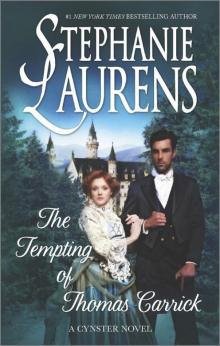 The Tempting of Thomas Carrick
The Tempting of Thomas Carrick![Cynster [22.00] A Match for Marcus Cynster Read online](http://i1.bookreadfree.com/i/03/16/cynster_[22_00]_a_match_for_marcus_cynster_preview.jpg) Cynster [22.00] A Match for Marcus Cynster
Cynster [22.00] A Match for Marcus Cynster All About Love c-6
All About Love c-6 Cobra 01 The Untamed Bride
Cobra 01 The Untamed Bride A Lady of Expectations and Other Stories
A Lady of Expectations and Other Stories By Winter's Light_A Cynster Novel
By Winter's Light_A Cynster Novel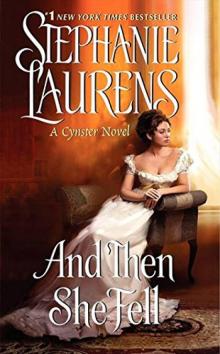 And Then She Fell
And Then She Fell The Greatest Challenge of Them All
The Greatest Challenge of Them All The Edge of Desire
The Edge of Desire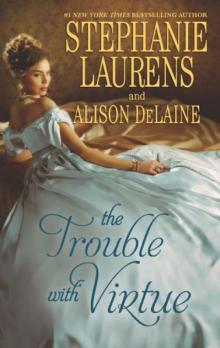 The Trouble With Virtue: A Comfortable WifeA Lady by Day
The Trouble With Virtue: A Comfortable WifeA Lady by Day Fair Juno
Fair Juno THE LEGEND OF NIMWAY HALL: 1750 - JACQUELINE
THE LEGEND OF NIMWAY HALL: 1750 - JACQUELINE Four In Hand
Four In Hand The Reckless Bride
The Reckless Bride Stephanie Laurens Rogues' Reform Bundle
Stephanie Laurens Rogues' Reform Bundle The Untamed Bride Plus Black Cobra 02-03 and Special Excerpt
The Untamed Bride Plus Black Cobra 02-03 and Special Excerpt The Lady's Command (Adventurers Quartet #1)
The Lady's Command (Adventurers Quartet #1) The Seduction of Sebastian Trantor
The Seduction of Sebastian Trantor The Daredevil Snared (The Adventurers Quartet Book 3)
The Daredevil Snared (The Adventurers Quartet Book 3)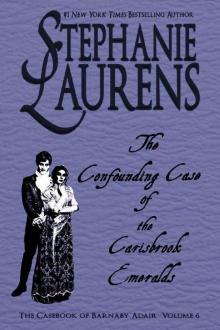 The Confounding Case Of The Carisbrook Emeralds (The Casebook of Barnaby Adair 6)
The Confounding Case Of The Carisbrook Emeralds (The Casebook of Barnaby Adair 6) Lord of the Privateers (The Adventurers Quartet)
Lord of the Privateers (The Adventurers Quartet)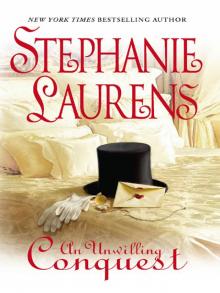 An Unwilling Conquest
An Unwilling Conquest Brazen Bride
Brazen Bride On a Wild Night
On a Wild Night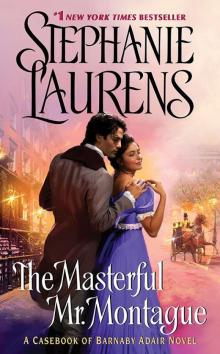 The Masterful Mr. Montague: A Casebook of Barnaby Adair Novel
The Masterful Mr. Montague: A Casebook of Barnaby Adair Novel Lord of the Privateers
Lord of the Privateers Royal Bridesmaids
Royal Bridesmaids Beyond Seduction
Beyond Seduction It Happened One Night
It Happened One Night The Ideal Bride
The Ideal Bride The Promise in a Kiss
The Promise in a Kiss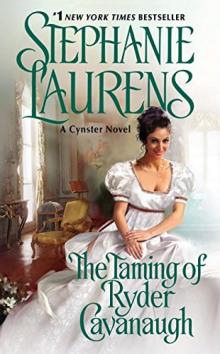 The Taming of Ryder Cavanaugh
The Taming of Ryder Cavanaugh The Ideal Bride c-12
The Ideal Bride c-12 All About Love
All About Love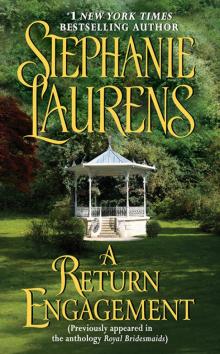 A Return Engagement
A Return Engagement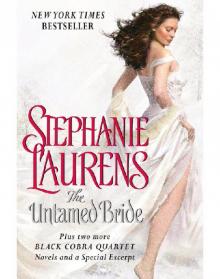 The Untamed Bride Plus Two Full Novels and Bonus Material
The Untamed Bride Plus Two Full Novels and Bonus Material Viscount Breckenridge to the Rescue
Viscount Breckenridge to the Rescue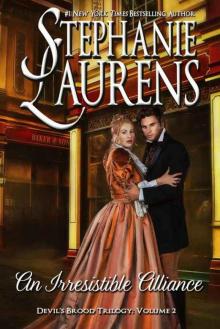 An Irresistible Alliance (Cynsters Next Generation Novels Book 5)
An Irresistible Alliance (Cynsters Next Generation Novels Book 5) The Daredevil Snared
The Daredevil Snared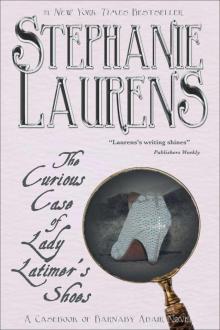 The Curious Case of Lady Latimer's Shoes: A Casebook of Barnaby Adair Novel
The Curious Case of Lady Latimer's Shoes: A Casebook of Barnaby Adair Novel A Lady of Expectations and Other Stories: A Lady of ExpectationsThe Secrets of a CourtesanHow to Woo a Spinster
A Lady of Expectations and Other Stories: A Lady of ExpectationsThe Secrets of a CourtesanHow to Woo a Spinster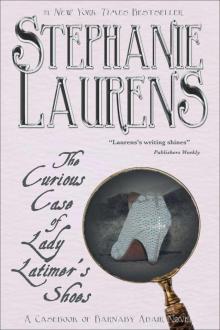 The Curious Case of Lady Latimer's Shoes: A Casebook of Barnaby Adair Novel (The Casebook of Barnaby Adair)
The Curious Case of Lady Latimer's Shoes: A Casebook of Barnaby Adair Novel (The Casebook of Barnaby Adair)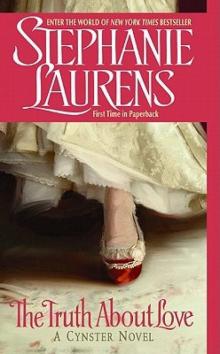 The Truth About Love
The Truth About Love A Rogue's Proposal
A Rogue's Proposal The Elusive Bride
The Elusive Bride The Perfect Lover
The Perfect Lover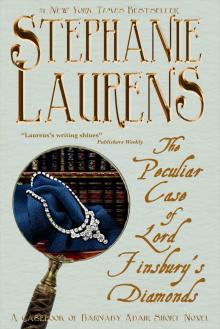 The Peculiar Case of Lord Finsbury's Diamonds: A Casebook of Barnaby Adair Short Novel
The Peculiar Case of Lord Finsbury's Diamonds: A Casebook of Barnaby Adair Short Novel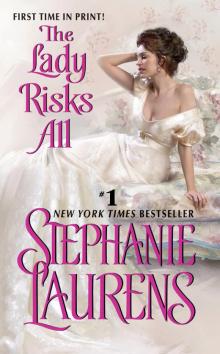 The Lady Risks All
The Lady Risks All The Murder at Mandeville Hall: The Casebook of Barnaby Adair: Volume 7
The Murder at Mandeville Hall: The Casebook of Barnaby Adair: Volume 7 All About Passion
All About Passion A Match for Marcus Cynster
A Match for Marcus Cynster By Winter's Light: A Cynster Novel (Cynster Special Book 2)
By Winter's Light: A Cynster Novel (Cynster Special Book 2)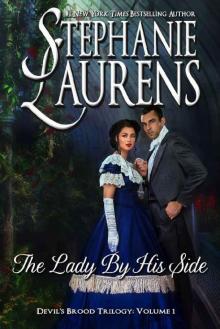 The Lady By His Side
The Lady By His Side The Pursuits of Lord Kit Cavanaugh
The Pursuits of Lord Kit Cavanaugh Tangled Reins
Tangled Reins To Distraction
To Distraction A Rake's Vow
A Rake's Vow A Comfortable Wife
A Comfortable Wife A Lady of His Own bc-3
A Lady of His Own bc-3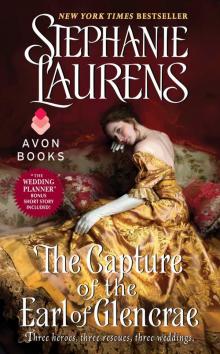 The Capture of the Earl of Glencrae
The Capture of the Earl of Glencrae Scandals Bride c-3
Scandals Bride c-3 Untamed Bride
Untamed Bride The Brazen Bride
The Brazen Bride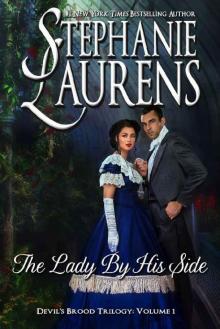 The Lady By His Side (Cynsters Next Generation Novels Book 4)
The Lady By His Side (Cynsters Next Generation Novels Book 4) Tangled Reins and Other Stories
Tangled Reins and Other Stories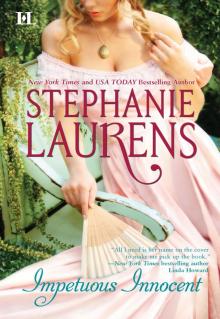 Impetuous Innocent
Impetuous Innocent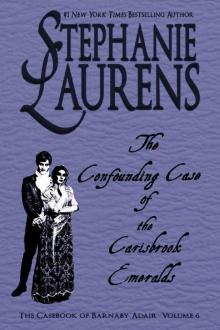 The Confounding Case Of The Carisbrook Emeralds
The Confounding Case Of The Carisbrook Emeralds Stephanie Laurens - B 6 Beyond Seduction
Stephanie Laurens - B 6 Beyond Seduction What Price Love?
What Price Love? A Fine Passion
A Fine Passion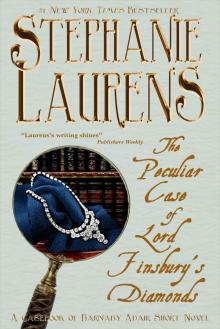 The Peculiar Case of Lord Finsbury's Diamonds: A Casebook of Barnaby Adair Short Novel (The Casebook of Barnaby Adair)
The Peculiar Case of Lord Finsbury's Diamonds: A Casebook of Barnaby Adair Short Novel (The Casebook of Barnaby Adair) Where the Heart Leads
Where the Heart Leads The Designs of Lord Randolph Cavanaugh
The Designs of Lord Randolph Cavanaugh A Secret Love c-5
A Secret Love c-5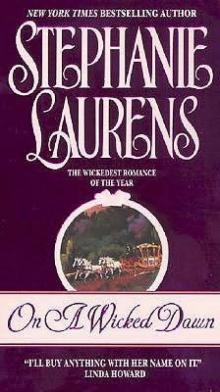 On a Wicked Dawn c-10
On a Wicked Dawn c-10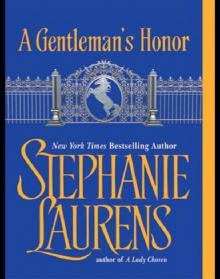 A Gentleman's Honor
A Gentleman's Honor THE LEGEND OF NIMWAY HALL_1750_JACQUELINE
THE LEGEND OF NIMWAY HALL_1750_JACQUELINE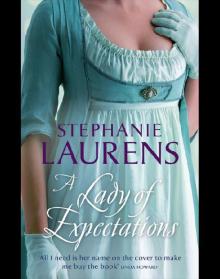 A Lady of Expectations
A Lady of Expectations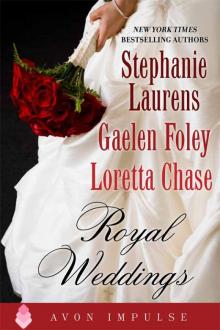 Royal Weddings: An Original Anthology
Royal Weddings: An Original Anthology The Ideal Bride (Cynster Novels)
The Ideal Bride (Cynster Novels) Mastered by Love
Mastered by Love A Buccaneer at Heart
A Buccaneer at Heart Captain Jack’s Woman / A Gentleman's Honor
Captain Jack’s Woman / A Gentleman's Honor Devil's Bride with Bonus Material
Devil's Bride with Bonus Material A Lady of His Own
A Lady of His Own A Secret Love
A Secret Love Melting Ice
Melting Ice Scandal's Bride
Scandal's Bride Lady Osbaldestone’s Christmas Goose
Lady Osbaldestone’s Christmas Goose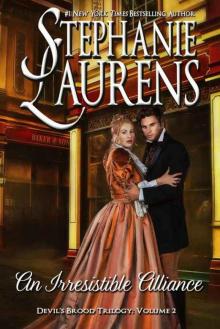 An Irresistible Alliance
An Irresistible Alliance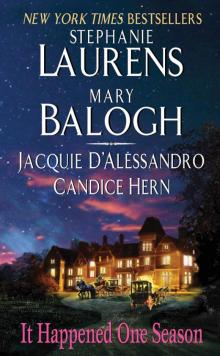 It Happened One Season
It Happened One Season In Pursuit Of Eliza Cynster
In Pursuit Of Eliza Cynster Captain Jack's Woman
Captain Jack's Woman The promise in a kiss c-8
The promise in a kiss c-8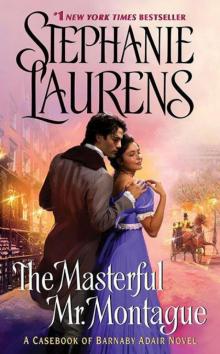 The Masterful Mr. Montague
The Masterful Mr. Montague The Lady Chosen
The Lady Chosen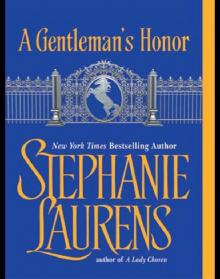 A Gentleman's Honor bc-2
A Gentleman's Honor bc-2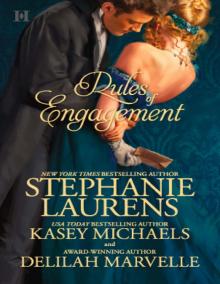 Rules of Engagement: The Reasons for MarriageThe Wedding PartyUnlaced (Lester Family)
Rules of Engagement: The Reasons for MarriageThe Wedding PartyUnlaced (Lester Family) Secrets of a Perfect Night
Secrets of a Perfect Night The Taste of Innocence
The Taste of Innocence On A Wicked Dawn
On A Wicked Dawn The Untamed Bride
The Untamed Bride A Rogues Proposal c-4
A Rogues Proposal c-4 Rakes Vow c-2
Rakes Vow c-2 Devils Bride c-1
Devils Bride c-1 Hero, Come Back
Hero, Come Back On a Wild Night c-8
On a Wild Night c-8 All About Passion c-7
All About Passion c-7